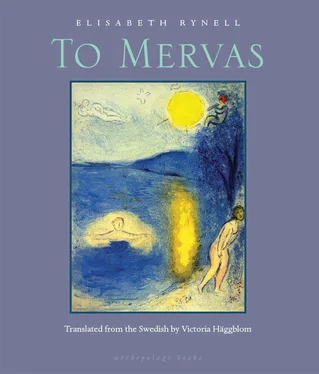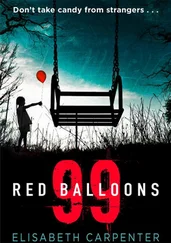It didn’t take Kosti more than five minutes to find her. He had been standing by the mining tower, looking out over the vast plains below, when he’d heard the scream. It was a terrible scream. He wasn’t certain that it was human, that it was Marta. But he immediately started running toward it, shaken and frightened. He skirted the edge of the forest; stumbled over branches, fell to the ground, got back on his feet. When he saw Marta, he froze. She heard him and turned toward him. Her eyes shimmered strangely green in her bloodied, soiled face.
“Marta! Mart! What happened?”
She pulled away from him when he got close, and rasped something he couldn’t hear.
“Was it an animal?” he asked, but she shook her head.
She felt so tired she thought she’d never be able to move again. Kosti studied her face carefully.
“You did this to yourself,” he said harshly. “You hurt yourself, you idiot.”
“I fell,” she whispered.
“Don’t even try. I’m not stupid. You did it yourself. Come on, we have to get back home before the damned mosquitoes eat you alive.”
Marta made herself heavy; she wanted to be a boulder, impossible to move.
“Come on now,” Kosti repeated, and tried to catch one of her arms, or a hand.
“You did it,” she said. “It was you.”
He stepped away from her quickly, as if he’d scorched himself on her. He slid his hand across his face, looking at her without speaking. She sat staring ahead at nothing. The only sound between them was the floating, unpleasant hum of the mosquitoes.
“Perhaps we shouldn’t have met again,” he said finally, as if speaking to himself. “Maybe it was all a mistake. Perhaps we should part from each other again. That might be best for both of us.”
A whimper from Marta silenced him. She was crying. He hesitated briefly, and then barked at her.
“Say you’re sorry or I won’t touch you. I won’t help you!”
She twitched at the tone of his voice, and from the corner of her eye, she saw that he’d gotten up and was getting ready to leave.
“I’m sorry,” she cried. “I’m sorry. Of course it wasn’t you.”
She felt him come close and embrace her; his arms surrounded her like a nest. Carefully, she began rocking in his arms, he didn’t try to stop her, he moved with her, cradled her. When after a while she turned up her face to look at him, his eyes were red and filled with tears.
“This isn’t easy,” he murmured. “But now we really have to go home and take care of your face. There are tiny shards everywhere in those cuts. Foolish woman! I hope you have tweezers with you, because I don’t.”
“I think I have some in my toiletry bag.”
“Good girl. Come on, let’s go.”
He held her up as they walked. As soon as they got out on the road, the cloud of mosquitoes was dissolved by the wind.
“I feel like saying something mean,” he said after they had walked for a while.
“Go ahead.”
“I was just thinking that when we return to the cabin, it will really be afterward for you. Then we’re going to truly confront what comes afterward .”
She tried to smile, but her face was stiff and hurt so much that it turned into a grimace instead.
“You’re not being nice,” she said.
“Neither are you.”
It was a lovely evening with warm, sweet-smelling air, and the sun’s golden light shimmered over the forest. The blackbird was singing, but Kosti and Marta stayed inside. She was stretched out on the bottom bunk with a wet cloth on her forehead, listening to Kosti. He sat at the table with the pipe in his mouth and a cup in front of him. With her eyes closed, she was listening to his voice, to the nuances of his tone.
“So you could actually say that it’s there, in Zimbabwe, that I’ve lived my life. The periods that I’ve been back in Sweden have mostly been like stopovers. I’ve come home to prepare for the next trip, or I’ve been back to arrange things so I could stay away longer. I don’t know why, that’s just how it turned out. Perhaps because I never got married and started a family.”
“And there was no woman in the picture?”
“Yes, there was someone. For almost ten years. She was Danish. Worked down there as well. An archaeologist. Well, that’s another story, I’ll have to tell you about Gina some other time. What I want to tell you about happened long after she and I parted. It was three, four years ago. I was at an excavation in an area south of Bulawayo, by the Matobo Hills, not far from Bambata, you know, the cave dwelling. It was me and another Swedish archaeologist. He was from around here. His name was Gustav, Gustav Jonsson. He was several years older than I. We lived together for almost six months in one of those bungalows left over from colonial times, a wonderful stone house with a dining room, a library, and a couple of studies and bedrooms. It was very British and very elegant. But the house was completely isolated, a couple of miles from the nearest village and hours from the closest city. So we spent a lot of time together, Gustav Jonsson and I, long workdays of digging at the excavation site, ten miles from the house, long dark evenings and nights in the house. After dinner, we often sat talking on the porch, in the dark. I really appreciated that I’d had the good fortune of sharing living quarters with an older colleague this time. Mostly I work with people in their twenties and early thirties. Nothing wrong with that, but I think I needed the stability of being around someone older. I was sort of lost, lost in my own issues. I didn’t feel wise or experienced at all. Just to hear someone say: ‘Well, when I was your age. .’ I really needed that.”
He interrupted himself and glanced at Marta.
“Are you listening? Or have you fallen asleep? I can’t see your face under that cloth.”
“I’m awake. I’m listening.”
“Anyway. One night Gustav and I stayed up late, sharing a bottle of brandy. He began telling stories from up north, where he grew up. He told me about an old shut-down mine in the middle of the woods, in the middle of the wilderness, and about a small mining town that had emptied when the mining ceased. There wasn’t a single house left there now, and no people. Just some concrete blocks, a valley contaminated by copper, and the remnants of a stone wall. He told me there’d been countless stories about this mine when he was growing up. It was still active back then and there were stories about the place that were older than the actual mine.”
He was quiet for a moment and fiddled with his pipe, packing the tobacco and trying to light it even though it sizzled and crackled with moisture.
“It was said,” he continued, “that deep inside the mountain, underneath the mine, there was a hidden entrance to an underground tunnel. It was allegedly twenty, thirty miles long, possibly even longer. No one knew how old the tunnel was, but there were naturally plenty of stories about how it had been created. It was said that it had been built during the reign of Queen Christina, when they were mining for silver up on Nasa Mountain. That it was the Sámi who had made it in order to save their gods and goddesses, to keep their shamans and their elf drums away from the Swedish authorities. Some people claimed that even though the Sámi had built the tunnel, they hadn’t done it on their own; it had been done with the help of magic. More realistically inclined individuals argued that it was a natural tunnel, that an underground river had passed through the mountain a long time ago. According to all the stories, the tunnel was supposed to lead to an incredibly beautiful island. It was surrounded by wide, wild torrents and could only be reached in one way: through this tunnel. It was said that on this island, gods and goddesses still wandered around, and there was a herd of shining white reindeer. Hundreds of elf drums were also hidden on the island, but the shamans that had escaped with them had obviously been dead for a long time. Well. . as you may understand, Mart, it was an incredible story. I sat there listening and shivered with excitement. But when he’d finished talking, Gustav simply laughed and said that this is what he’d heard in the cottages in his childhood. I’m sure we could hear stories like this in the village today too, even though they probably wouldn’t share them with us. I’d gotten goose bumps hearing Gustav’s story and wanted to know if anyone had ever found the tunnel. Oh no, he said, of course no one’s found it. Even though people claim this and that, everyone always knew it was nothing but a fairy tale. But I still wanted to know more. I wanted to know where that closed mine was located, what its name was. Gustav just shook his head. ‘It’s called Mervas,’ he said, ‘but I don’t even think there’s a road there anymore.’ ”
Читать дальше












